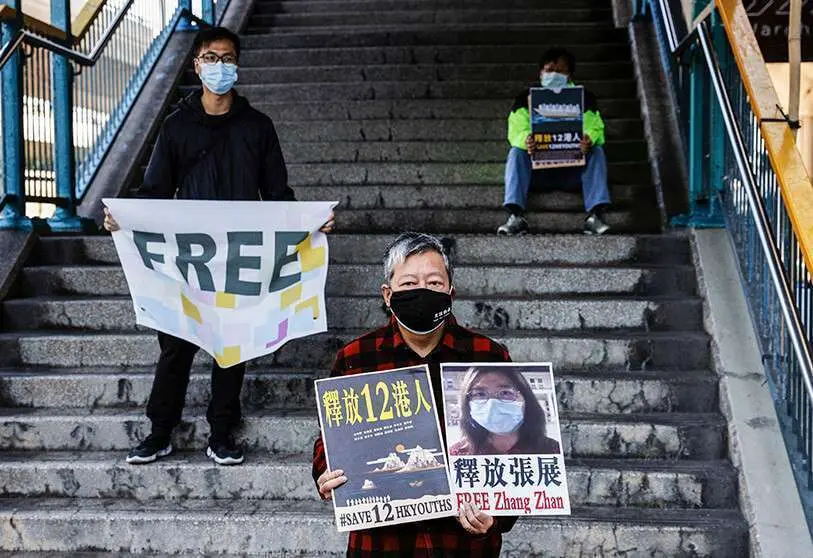Using COVID-19 to crush liberties

Zhang Zhan alone symbolises the retreat of freedoms around the world under the guise of the coronavirus pandemic. A Shanghai court, after a speedy trial and without foreign witnesses, sentenced her to four years in prison. What was the crime? 'Picking quarrels and provoking trouble', according to the court's verdict. The Chinese regime's justice system considers the 37-year-old Christian lawyer guilty of having filmed and broadcast on social networks videos of Wuhan's hospitals, which were overwhelmed by the massive influx of patients suffering from COVID-19. The virus, although its true origin is still unclear, was spreading through that city of eleven million inhabitants and infecting all of humanity at an uncontrollable rate.
The World Health Organisation (WHO) delegation, which is about to visit the scene where the plague allegedly originated, will clearly not be able to take into account in its investigations the accounts of Zhang Zhan, who has been weakened by the hunger strike she has been on since her imprisonment in March and has since been subjected to the traditional courtesy of Chinese prisons. It is obvious, therefore, that the Chinese government's transparency in its reporting to the WHO is highly questionable.
It is not only the Beijing regime that invokes "national security" as the ultimate argument for imposing drastic bans, curtailing essential freedoms and tightly controlling its population. Both the UN and various international institutes and observatories note that the pandemic has served as a pretext for the most authoritarian regimes to tighten up their totalitarianism while those with the strongest democratic tradition have experienced major setbacks in the exercise of their freedoms.
The most recent study on this subject is conducted by the Institute for Democracy and Electoral Assistance (Idea). According to the report issued by this organisation, based in Sweden and largely financed by the European Union, 43% of democratic countries and 90% of non-democratic countries have taken "illegal, disproportionate, indefinite or unnecessary measures" in the course of 2020.
China did not need COVID-19 to hold firm to its goals of curtailing any threat to "national security", but it is evident that, a few months before celebrating the centenary of the establishment of the Chinese Communist Party (CCP) on 1 July 2021, the regime considers a threat any attempt to find out or describe what happened and is happening not only in Wuhan but also concerning the so-called cultural revolution under Mao Zedong or the Tiananmen massacre with Deng Xiaoping; the mass arrests of the Uyghur Muslims or the resistance of the Tibetan exile. Beijing has also generally introduced video surveillance of the entire population.
Similar invocations have served to harden even more dictatorships such as the Cuban, Venezuelan and Nicaraguan ones. In the latter, President Daniel Ortega has imposed a law which labels any criticism of the opposition as "terrorist", a replica of that which has been going on in Cuba for a long time and which Nicolás Maduro is attempting to introduce in Caracas permanently.
Russia and Turkey, referred to by Idea as hybrid regimes, that is, halfway between real authoritarianism and formal democracy, have also tightened up their legislation by increasingly limiting the right of association, making it impossible to investigate and denounce any abuse of power and corruption. The crushing of basic freedoms has also been brutal in cases such as Belarus and Azerbaijan, and countries such as India, Cambodia and Bangladesh have not escaped the hardening either.
Within the European Union, control over the population and especially over the opposition in Hungary, Poland, Slovenia and Slovakia has increased. However, the most consolidated democracies have not escaped authoritarian impulses either; after all, having an entire country confined to its homes while the police and armed forces are the absolute masters of deserted streets and squares is the golden dream of any autocrat. Thus, the opposition has denounced serious setbacks in Donald Trump's United States rule of law or in the Spain governed by Pedro Sánchez.
The United Nations and the human rights observatories are calling for the cuts in freedoms imposed to be reversed by taking advantage of the fight against the coronavirus. Surely, when the nightmare of the pandemic is over, it will have been much easier to introduce and promote authoritarianism than to lay the foundations of democracy.

